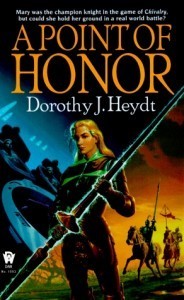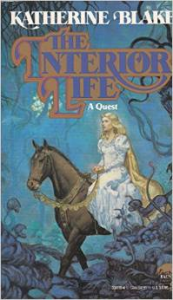Recent Reading: A POINT OF HONOR by Dorothy J Heydt
So, as you may recall, Dorothy J Heydt is the real name of “Katherine Blake.” Under the former name, Heydt wrote POINT OF HONOR, which came out in 1998 from, let’s see here, DAW. Under the latter name, she wrote AN INTERIOR LIFE which came out in 1990 from Baen. Heydt didn’t write any other novels, though I gather she wrote a fair number of short stories.
Now, as it happens, I first read AN INTERIOR LIFE a long time ago. I bet I read it the year it came out, though I don’t remember for sure. I’ve read it several times since then, and as I say, it’s unusual – structurally unusual. I’ve mentioned it before, but let me reprise briefly here: There are two very distinct plotlines that are hardly connected at all: in one we have Sue, a wife and mother in a contemporary setting, involved with deciding what to cook for dinner and what color to paint the living room, and her family; and then in the other we have Marianella and Lady Amalia and a bunch of others in a fantasy setting where the Darkness is encroaching on the lands of men. Sue can see and talk to and more or less share in the experiences of Marianella and the others, and many of them can talk to her, but basically the two worlds are separate at the beginning, separate all through the story, and separate at the end. Sue plays no role at all in the excitement that takes place in the fantasy world, and Marianella and the rest play essentially no active role in Sue’s life, either, though they influence her growing interest in music and so forth.
So, that’s certainly different. Juxtaposing the two storylines like that somehow infuses Sue’s ordinary life with interest and I find it the more appealing of the two stories. I can hardly imagine how Heydt got this book past her Baen editor, except I guess the editor had the same reaction I did – “Strange how this works when by all rights shouldn’t, but hey, here it is, working.”
Now, I didn’t hear about Dorothy Heydt being the real name of Katherine Blake for a long time, but when I found out, I picked up A POINT OF HONOR. Well, I thought it would be a definite contrast to the other books I’ve read recently, especially ICE CREAM STAR, so I picked it up off my TBR pile and gave it a try. It turned out to be a good choice – it was easy to read, easy to enjoy, and I wound up liking it a lot.
It’s a virtual reality story, with a near-ish future world as the frame setting and a variety of interconnected fantasy-esque worlds in the VR setting. The pov protagonist is Mary Craven, an interesting choice of names for a character who is pretty much defined by her fearlessness. “Inside,” she is known by the more appropriate name of Sir Mary de Courcy, and she has just won the championship of the Winchester Lists in a jousting VR setting.
This book has a lot of flaws, which are mostly interesting flaws that don’t detract very much at all from the reading experience. The actual writing is solid and I liked Mary a lot, and also Greg, the male lead. He’s a “Lord of the Lists” – a programmer of the VR realities, who can look past the outward VR setting to the code beneath, and program on the fly if necessary. In other words, when they’re “inside,” Mary is a knight and Greg is a wizard.
The basic plot concerns Mary finding herself the target of one murder attempt after another and helping Greg figure out why and track down the culprits. I say “helping Greg” because Mary herself, though the pov protagonist, plays a very, very subsidiary role in driving the plot. For the longest time, I could not imagine why Greg needed her help at all, except that I supposed he just liked having company on his quest. Much farther into the story, it finally starts to look like he does actually need her help, but wow, he is a very powerful wizard / sharp programmer. So that’s a flaw, if you like: the protagonist not driving the plot. Making sure your protagonist does drive the plot is a very basic thing, a real fundamental.* So this struck me as kind of like what was going on with Sue in AN INTERIOR LIFE, right? Because Sue did not actually influence the plot in the fantasy half of the story, yet it didn’t seem to matter much to the readability of the story. In the same way, though Mary does not really have a very important role in driving her plot, the story is still perfectly readable and enjoyable.
You remember how Sue connects with Marianella because she just does, with no explanation given? Well, Mary connects with Greg in kind of that way. When Greg first contacts Mary, with this, “Hey, please come “inside” to talk to me even though you’ve just been attacked and don’t know me a bit,” she basically just goes, “Sure, why not?” To me, this decision cried out for more of a justification than just The Author Wants You Two To Get Together, but really, that was all there was. I mean, there is a slow romance between them, though I must say their relationship develops with quite restrained sexual energy by current standards – almost no thoughts about how hot / beautiful / physically splendid the other person is, very little physical awareness overall. (This is not a criticism; I like a restrained romance and seriously dislike the “he’s SO super-hot” modern male lead we see so often these days.)
More than that, I thought some aspects of the fantasy plotline from AN INTERIOR LIFE were highly predictable. So were some of the plot twists of A POINT OF HONOR. The identity of the actual bad guy is not in the least surprising; the identity of the minor sidekick bad guy is also rather obvious, at least in general terms. So, as far as WOW DIDN’T SEE THAT COMING, well, no, not so much.
So you see what I mean about flaws.
Yet none of this – none of it – interferes particularly with the reading experience. The setting is a pleasure to read about, the way Heydt handles the VR thing is really a lot of fun – I haven’t read enough VR stuff to be at all bored by it – Mary is a good enough protagonist to carry the story, Greg is a calmly proficient wizard/programmer, and the reader is just carried gently along from front to back without a lot of tension about how the story is ultimately going to end. A pleasant, thoroughly readable, low-tension story is just the sort that becomes a comfort read for me, so I fully expect to revisit this one in the future.
*Another book where the putative protagonists basically don’t influence the plot is THE BELL AT SEELY HEAD by Patricia McKillip, so you do see a story like this from time to time and obviously a good-enough writer can pull it off. Are there any other books you can think of where the protagonist(s) do not really drive the plot?





